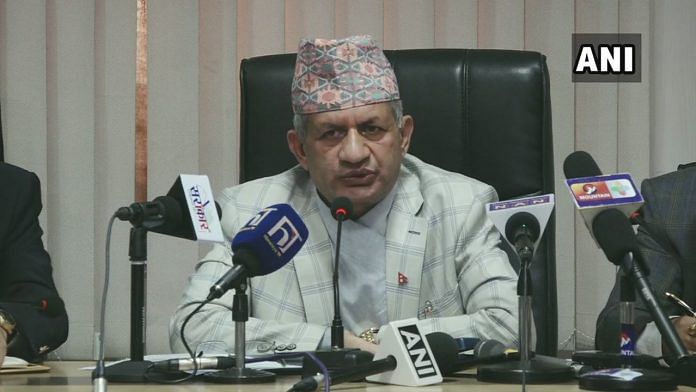New Delhi: Nepal wants India to revisit the 1950 Indo-Nepal Treaty of Peace and Friendship in order to reflect “changes and new realities” of contemporary bilateral ties even as Kathmandu believes the outstanding issue of the boundary can be resolved through “facts, evidences and historical documents”.
Nepal Foreign Minister Pradeep Kumar Gyawali, who concluded his three-day trip to India Saturday, said despite the challenges posed by the Covid-19 pandemic and a “few misunderstandings” that occurred in recent months, both sides were able to maintain the partnership.
“To mirror the changed context of the 21th Century, to mirror the aspirations of the people, we have to address a few outstanding issues as well. Nepal has put on the table the revision of the 1950 friendship treaty and during the years, many changes have taken place in both countries. So to reflect these changes, we want to review it and revise it and to develop new documents, so that it can reflect the realities,” Gyawali told a select group of journalists Saturday over a breakfast meeting.
He said the issue of revising the treaty was discussed when he met his Indian counterpart S. Jaishankar.
Gyawali reiterated that this was one of the main points that was also highlighted in the report that was created by the Eminent Persons’ Group (EPG) on Nepal-India relations, which was established in 2016 under a joint mandate by both the prime ministers of India and Nepal with the objective of upgrading bilateral ties.
The EPG finalised its report and submitted it to the respective prime ministers in 2018. However, since then no action has been taken on the recommendations made by the group.
“That report will help us give a clear picture (of India-Nepal bilateral relationship)… We requested our Indian friends to facilitate an early submission, so that both governments can study and chalk out a strategy to implement it,” he said.
Gyawali, meanwhile, couldn’t meet Prime Minister Narendra Modi during his visit even though the Nepali delegation was expecting it as when Foreign Secretary Harsh V. Shringla had visited the Himalayan nation in November last year, their Prime Minister K.P. Sharma Oli had met him.
Also read: Modi said Neighbourhood First and then ranked Nepal low in India’s priority list
‘We have to explore ways to settle boundary issue’
Gyawali said that in 1981, when a joint technical committee on mapping the boundary was created between India and Nepal, “two major segments” of Kalapani (in west of Nepal) and Susta (in south of Nepal) were not mapped.
“In 2014, both governments formed a Border Working Group… But they did not have the mandate to work on the remaining segments,” he said, adding that foreign secretaries of both sides were asked to work on this.
“Unfortunately, there has been no single meeting of the foreign secretaries and then came the updated edition of the Indian map (2019). We sent a note then to have a meeting, but there was no concrete response (from Indian side),” he said.
“We would have to finalise it and we have to explore ways to settle it based on facts and documents… Let the facts, evidence, historical documents speak the reality so that we can be free from historical baggage, so that we can be focused for future generations.”
Inland water connectivity, Pancheshwar project
Gyawali, who met Defence Minister Rajnath Singh Saturday, also said Nepal has sought inland water connectivity with India through Bay of Bengal via the Ganges.
He, however, stressed on the need to implement the Pancheshwar Multipurpose Project (PMP), which is being delayed for more than two decades now. The PMP is a bi-national hydropower project to be developed in Mahakali River bordering Nepal and India.
“It is waiting for further intervention, it was supposed and is supposed to be a game-changer for hydroelectricity generation, it has been waiting for more than two decades,” he said.
The Nepal foreign minister also said that recently talks were held on the project when their Energy Secretary Dinesh Kumar Ghimire led a delegation to India in November.
Also read: Kathmandu crossed red lines. India-Nepal relations are entering a deep freeze




No, the EPG report has not been submitted. Please verify your facts before publishing. The EPG report as agreed before between the two prime ministers was to be first submitted to the Indian prime minister and then the Nepali prime minister. However, the Indian side hasn’t yet allowed for it’s submission to the Indian prime minister. Hence, halting its process. Please note that the report was created by experts from both the countries and had the blessing of both the prime ministers in 2016. It had been completed on time, satisfactorily to both the groups of experts in 2018 but it seems the political powers in India just doesn’t want the issues to be resolved mutually and is hell-bent on “resolving” it unilaterally.